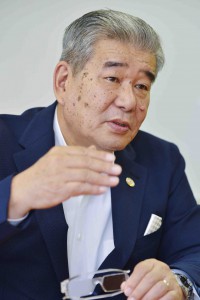[First in a series]
<The upcoming Upper House election focuses mainly on economic policies and less on agriculture and rural villages. What will happen to our food resources under the Trans-Pacific Partnership agreement? How did lives in rural areas change under the “economy comes first” policy? These are significant issues that are closely related to the Japanese people. The Japan Agricultural News asked three experts what they think are the issues which need to be addressed in the election.>
Current policies regarding metropolitan and rural areas are contradictory in two ways.
While the government promotes regional revitalization, it also advocates the “super mega region plan” to encourage concentration of working age population in metropolitan areas. This plan might help improve the productivity and lead to the overall economic growth of the nation, but does not appear to help energize regional areas.
The other concern is that the government cares only about the quality and prices of farm products, as well as the productivity of farming, and does not properly evaluate the multifaceted contribution made by the agriculture, forestry and fisheries industry in addition to food production. The role of agriculture cannot be judged only by the amount of crops, because it bears various other tasks including protecting land from natural disasters, preserving biodiversity and offering emotional retreats.
Ever since the old days, the Japanese people led their lives thinking how to coexist with nature. In medieval Europe, cities were surrounded by ramparts and people were isolated from nature. However, in Japan in the Edo Period, castles of daimyo, or feudal lords, were surrounded by gardens and farmlands instead of by walls. The Japanese people in those days had already created a recycling society where human excrement discharged in cities is returned to the soil, with farmlands functioning as filters.
The same is true of hilly and mountainous areas. Rice terraces do not exist only for rice production. By building stone walls on steep hillside and laying Arakida diatomaceous soil, the terraces can hold more water and make the slopes less vulnerable to landslides.
In many of Japanese folktales, such as “Momotaro,” an old man goes to the mountains to cut grass while his wife goes to a river to wash clothes. People cut grass because it was necessary for them to continue obtaining the blessings of nature. Nature cannot be preserved unless humans make efforts to protect it. In that sense, folktales can be regarded as the nation’s first form of environmental education.
People living and farming in hilly and mountainous areas have contributed to maintaining and improving the nation’s disaster prevention capabilities. Recently, however, such sustainable coexistence of humans and nature is disappearing.
In Europe, people feel responsible for having destroyed nature since the Industrial Revolution. In Great Britain where gardening is popular, people developed the English landscape gardens to restore nature as an atonement for distorting the natural environment through industrial development.
The European Union provides income compensation for farmers in disadvantaged areas with the aim of maintaining the countryside and sustainable farming systems. Unless Japan introduces a similar scheme, agriculture in hilly and mountainous areas will decline and there will be no one who would live in areas with constraints and work as the “caretakers of Japanese land.”
In order to realize both the rural revitalization and the development of the nation as a whole, we need a leader who can draw a vision of Japan 10 or 20 years from now, based on multifaceted views on the history, culture and regional structure of each area. Voters should make decisions based on more futuristic views, thinking what is necessary for the next generations, instead of focusing on the immediate future.
It would be best if Japan can further develop the recycling society and the coexistence with nature which the country has maintained, and at the same time find a way for metropolitan areas and rural areas to coexist.
<Profile> Born in 1945 in Kanagawa Prefecture, Shiro Wakui currently serves as Distinguished Professor at Tokyo City University’s Faculty of Environmental Studies. He was a General Producer of Aichi Expo 2005. He also appears on TV shows as a commentator under the pseudonym Masayuki Wakui.


